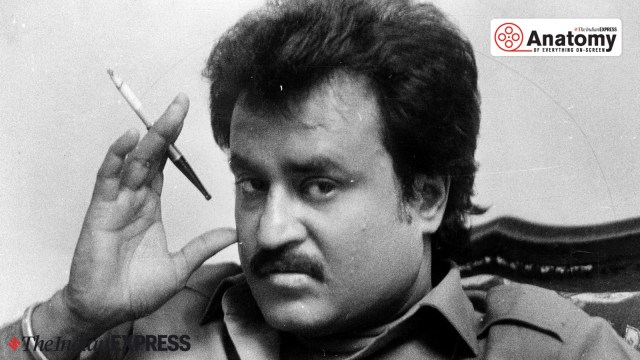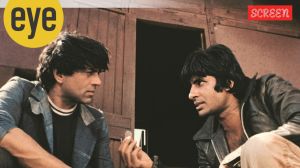Click here to follow Screen Digital on YouTube and stay updated with the latest from the world of cinema.
Beneath Rajinikanth’s ‘Style Mannan’ persona lies a powerful performer
Ace director J Mahendran, often regarded as one of the greatest filmmakers in the history of Tamil cinema, astutely recognised and brought forth Rajinikanth's untapped acting abilities in the three films they collaborated on as director and actor.
 Rajinikanth celebrates his 73rd birthday today. (Express archive photo)
Rajinikanth celebrates his 73rd birthday today. (Express archive photo)“Thalaivar,” “Superstar,” “Style Mannan,” et al, are sobriquets that have long adorned Rajinikanth’s name. With an impressive knack for captivating audiences through his swag, style, charm and ability to connect with the average viewer, Rajinikanth, who turns 73 on Tuesday (December 12), has dominated Tamil cinema for over four decades. Yet, the label of a “brilliant actor” has seldom been attributed to him, and rightfully so. Given the abundance of acting prowess among Indian cinema stars, Rajinikanth, while a decent actor, never took on or received roles that showcased his performance abilities and he, instead, focused on appealing to audiences eager to witness the Rajinikanth they wish to see on-screen.
However, it can never be said that Rajinikanth is a poor actor. In fact, to continue enthralling audiences all these years requires talent that he has consistently exhibited. Even in his first movie, Apoorva Raagangal (1975), helmed by K Balachander, there were initial glimpses of his acting potential. Regrettably, only a few directors attempted to tap into this after that.
Nevertheless, ace director J Mahendran, often regarded as one of the greatest filmmakers in the history of Tamil cinema, astutely recognised and brought forth Rajini’s untapped acting abilities in the three films they collaborated on as director and actor — Mullum Malarum (1978), Johnny (1980) and Kai Kodukkum Kai (1984).
One of the most groundbreaking films in Tamil cinema, Mullum Malarum marked Mahendran’s debut as a director after having written stories and dialogues for several movies. The film came to Rajini at a time when he was predominantly playing antagonist roles or characters that didn’t fully tap into his acting potential. Consequently, it served as a turning point in his career too.
The movie, characterised by its realistic approach and a grounded narrative with minimal commercial elements, also featured the late renowned actor Shoba in the role of Rajini’s sister. Alongside Shoba, a stellar actor who had by then proved her mettle, Rajini delivered an exceptional performance that seamlessly aligned with the film’s tone and mood.
One of the film’s most beautiful moments is when Kali (Rajini) arrives home drunk and heartbroken after lashing out at Valli (Shoba) earlier in the day. Both Shoba and Rajini exhibited their acting prowess in this scene, illuminating the screen with their heartfelt on-screen chemistry as well. Rajini’s ability to hold his own against the National Award-winning powerhouse actor Shoba emphasised that he should not be underestimated as just a mediocre actor.
Even the action sequences and dance scenes in Mullum Malarum differed significantly from conventional styles, showcasing Mahendran’s adept use of a realistic approach, a departure from Rajini’s previous works. The film also gave rise to a song that epitomised his career as a Superstar, “Raaman aandalum Raavanan aandalum, enakkoru kavalai ille… (Let Ram or Raavan rule, I don’t care…)”
As the film progresses, we also witness Kali with shades of grey, consumed by anger and ego after a tragic incident costs him his left hand. Nevertheless, Mullum Malarum crafts a compelling arc for Kali, revealing a change of heart towards the end as he listens to his sister’s concerns, emphasising that nothing holds more value and significance in his world than his sister. In contrast to later films in the Superstar’s career, Mahendran’s Mullum Malarum portrayed that beneath Rajinikanth’s ‘Style Mannan’ persona lies a reservoir of talent.
Mahendran recognised Rajini’s captivating presence on-screen, and in their next collaboration, Johnny, skillfully showcased the star-actor at his charismatic best, while also ensuring he received ample space to perform.
The initial glimpse we get of Rajini in the film is him shirtless, with a burning cigarette, stylishly wearing power glasses and painting his car to elude the police. The title cards show “Rajinikanth and Rajinikanth,” emphasising his dual role and subtly alluding to the two facets of the star-actor we will encounter.
Despite being a con artist settling his father’s financial debts through fraud, Johnny is portrayed as anything but evil. Born to his father’s mistress, Johnny harbours deep love for both parents, yet struggles to express it to his father as it still hurts him that he can’t tell the world who his father is. Despite his criminal endeavours, he remains a devoted son to his late mother. Beyond this, Johnny has a romantic side too, as he falls for the talented singer Archana (Sridevi), showcasing the softer aspect of the Style Mannan.
Rajini’s second role in the film, Vidyasagar, Johnny’s doppelgänger, starkly contrasts the con artist. Working as a barber in an upscale salon, Vidyasagar leads a carefree and frugal life. Despite their dissimilarities, the common thread between them is their affinity for money. Rajini, however, ensures that, despite visual similarities, Johnny and Vidyasagar display distinct mannerisms and body language. Even in shared scenes, the actor maintains a clear separation between the two characters, surprising audiences with the unexpected depth of his performance.
While Mahendran’s Kai Kodukkum Kai extensively delved into Rajini’s acting capabilities, it also included moments tailored for Superstar fans such as him engaging in Silambam with a rival. Despite incorporating similar commercial elements like a dance sequence featuring Rajini and additional action scenes, Mahendran ensured that Kai Kodukkum Kai was not just about those things.
The drama also took an unconventional approach in its ending, making it a rarity for its time. Notably, the film deviated from the usual portrayal of a rape victim taking her life or the male lead seeking revenge by killing the culprit for personal satisfaction, giving no hoots to the survivor. Despite the unconventional resolution for his character in the climax, Rajini adeptly portrayed the role, emphasising that his abilities extend beyond mere swagger.
Photos



- 01
- 02
- 03
- 04
- 05































